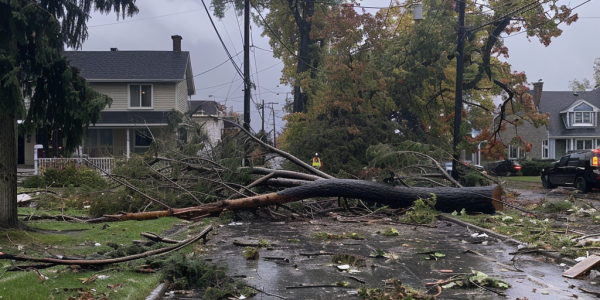HOOPP Appoints Annesley Wallace as New CEO
The Healthcare of Ontario Pension Plan (HOOPP) has appointed Annesley Wallace as its new CEO, effective April 1, 2025. With a focus on delivering strong returns and enhancing investment strategies, Wallace’s leadership is set to navigate the complexities of the financial landscape while ensuring retirement security for healthcare professionals in Ontario.
McKevitt Trucking Ceases Operations, Impacting Northern Ontario Transportation Sector
McKevitt Trucking, a key player in Northern Ontario’s transportation industry since 1948, has officially ceased operations as of October 31. This closure, impacting local employment and logistics, raises concerns about the future of the region’s freight services. As the community seeks to fill the void left by McKevitt Trucking, stakeholders must explore new opportunities in the evolving transportation landscape.
Island Health Urges Vaccinations Amid Rising Whooping Cough Cases on Vancouver Island
As whooping cough cases surge on Vancouver Island, health officials are urging vaccinations to protect the community. With 17 recent diagnoses, Island Health emphasizes the importance of immunization for infants, children, and adults to prevent this highly contagious respiratory infection. Learn more about vaccination schedules and stay informed to safeguard your health.
Severe Storm Hits Brantford, Causing Damage and Power Outages
A sudden and intense storm hit Brantford and Brant County, causing downed trees, power outages, and heavy rainfall. Meteorologist Gerald Cheng confirmed wind gusts reached 83 km/hr, while Environment Canada warned of potential torrential downpours. Local authorities responded swiftly to the damage, urging residents to stay alert and prepared for future storms as Ontario faces one of its wettest summers on record.
Ontario Researchers Disappointed as Funding for Critical Wastewater Monitoring Program Set to End
Ontario researchers are facing disappointment as provincial funding for a critical wastewater monitoring program is set to be terminated, bringing an end to vital research efforts. The decision to cut funding for the program, which has been instrumental in monitoring not only COVID-19 but also other respiratory viruses and contaminants in the water, has sparked concerns among experts. Mark Servos, a biology professor at the University of Waterloo and the Canada research chair in water quality protection, has been at the forefront of this research initiative. The program, which involved monitoring wastewater in various regions of the province, provided valuable insights beyond just COVID-19 markers, including tracking levels of influenza A, influenza B, RSV (respiratory syncytial virus), and other contaminants.
Parents in London, Ontario Struggle as Grocery Stores Lock Up Baby Formula Due to Soaring Costs
Parents in London, Ontario are facing challenges as grocery stores lock up baby formula due to soaring costs, sparking concerns among families. With prices surging by 30%, some parents reveal a week’s supply can range from $30 to $70. The situation reflects broader affordability issues, leading some to resort to tactics like signing up for samples to make their supply last longer.
What’s Open and Closed in Toronto for the Easter Long Weekend
Find out what will be open and closed in Toronto during the Easter long weekend. From grocery stores to transit services, plan your activities and errands accordingly with the adjusted schedules and closures.
Study Finds Higher Risk of Dementia in Homeless Individuals
A new study reveals that people experiencing homelessness are 1.9 times more likely to develop dementia at younger ages compared to the general population. Lead author Dr. Richard Booth highlighted the significant difference in dementia prevalence, especially between the ages of 55 to 64 years, and emphasized the strong link between homelessness and accelerated aging. The researchers found that within the ages of 55–74 years, rates of dementia were 4 to 5 times higher than the general population and 3 to 3.5 times higher than the low-income group. Dr. Booth stressed the potential impact of these findings, suggesting that unhoused individuals should be screened for dementia at younger ages. Early screening and intervention are crucial in this vulnerable population.








